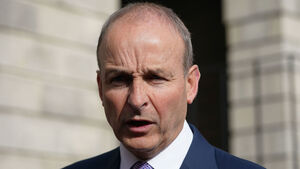The Kettle's Boyled: A united Ireland? Let’s first unite the people

Taoiseach Micheal Martin has recently taken the emphasis away from the border poll segment of the GFA and has instead moved towards the agreement’s pledge to ‘strive in every practical way towards reconciliation.’
Whoever decided to use the term ‘The Troubles’ to describe half a century of conflict in Northern Ireland should surely get an award for coining the understatement of the twentieth century. It’s right up there with ‘Heuston, we have a problem,’ and outshines the designation of the impact of World War Two on our neutral country as ‘The emergency.’
The period of ‘the Troubles’ between August 1969 and the Good Friday Agreement of April 1998 saw the loss of 3,720 lives as well as the injuring and maiming of nearly 48,000 more. It left a society so deeply traumatised that as Henry Hemming points out in his book ‘Four shots in the night,’ more people have taken their own lives in Northern Ireland since the Good Friday Agreement than died in the conflict itself.
That’s an awful lot of people killed, maimed or permanently traumatised, and for what? If we listen to so-called ‘republicans’ on this island, it was all about achieving Irish unity. So why is that unity further away now than it was in 1969?
Garret FitzGerald always said the real border was in the hearts and minds of people, but nobody listened. More recently, the respected Irish author David Rice pointed out that in order to unify Ireland, we must first unify Northern Ireland, a place bitterly divided on sectarian lines. But modern-day so-called ‘republicans’ continue to cause division with the eulogising of sectarian killers and their obsession with a border poll. Fianna Fail, despite Albert Reynolds kick-starting a process finished by Bertie Ahern with the Good Friday Agreement, was always seen as leaning towards the ‘rabid republican’ side of the debate, while Fine Gael always appeared to own the more moderate ground.
But something has changed. From the original Fine Gael caution about encouraging division, a chase after the populist vote saw Leo Varadkar make ill-advised noises about a premature border poll, a sure route to civil war if done without first uniting the tribes. Caution, and a more conciliatory approach has come in recent weeks from an unexpected source, from the current Taoiseach and Fianna Fail leader Michael Martin. I was never much of a fan of Martin, but he is growing on me. He has recently taken the emphasis away from the border poll segment of the GFA and has instead moved towards the agreement’s pledge to ‘strive in every practical way towards reconciliation.’ On such small changes of emphasis does history often turn. Sinn Fein’s simplistic plan for a border poll by 2030, ramming a million Unionists into a state they see as hostile, is no kind of an answer to anything. But Michael Martin’s work on the Shared Island Initiative, and his determination to take the heat out of the deep-rooted sectarianism on both sides of the border could well be, as Paul Brady once wrote, what brings us all together in the end.





